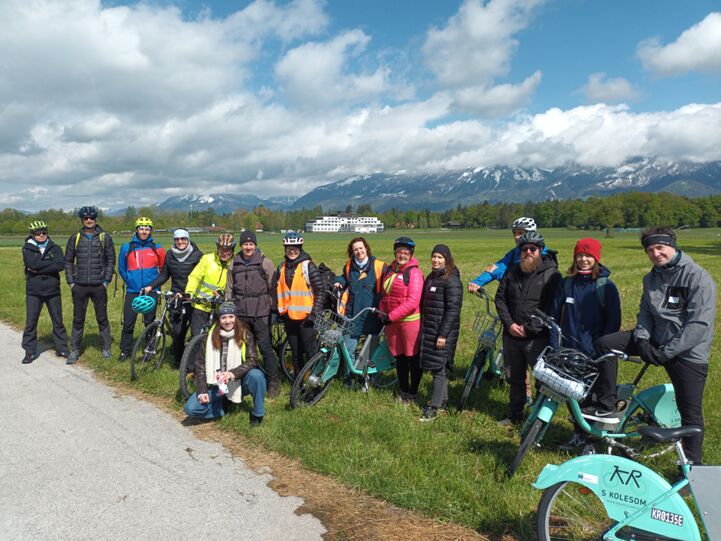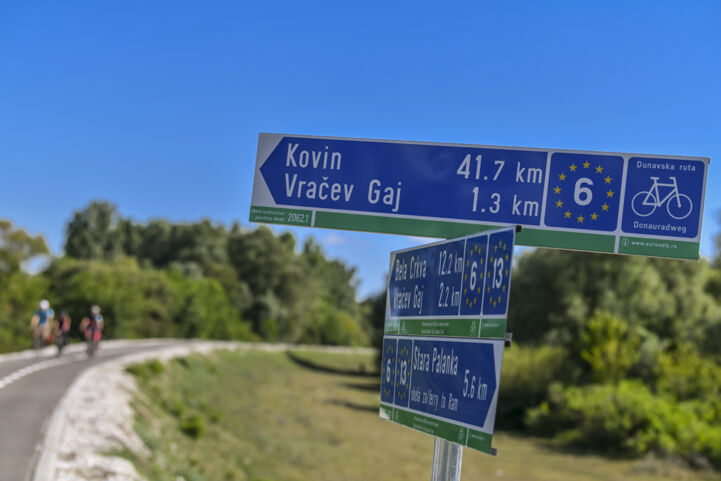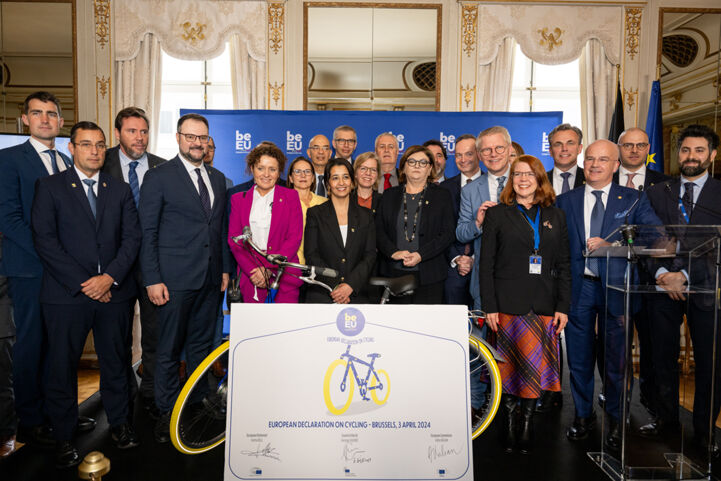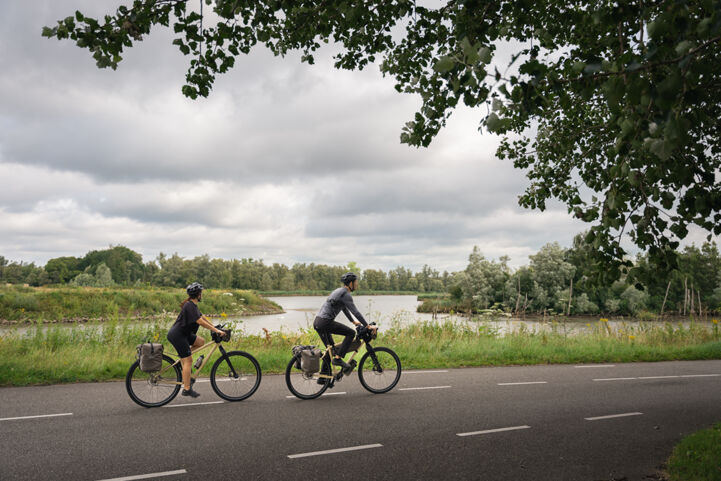EuroVelo and cycling tourism highlights of 2024
Raising the bar for quality cycle routes for all and everywhere
This year the deployment of the European Certification Standard (ECS), a methodology created by ECF to assess the quality of cycle routes, has shifted into high gear. ECS surveys were undertaken in eleven countries in 2024. In countries like France, Austria, Croatia, Germany, Switzerland and Denmark, the ECS methodology was used to gather knowledge about cycling infrastructure, cycling-friendly services, and route promotion, leading to a better understanding of what is needed for a higher-quality cycle route network both nationally and on a European level. The growing interest in ECS reflects the strength of the methodology and increased emphasis on quality from various stakeholders.
One new route stretch can be proud of its EuroVelo Certification: The French section of EuroVelo 1 – Atlantic Coast Route, nationally branded as ‘La Vélodyssée’. This 1,300 km route following the coast of France from Roscoff in Brittany to Hendaye in the Basque Country is the second EuroVelo route to reach the level of development required for EuroVelo Certification after EuroVelo 15 – Rhine Cycle Route, certified since 2015. The EuroVelo Certification can be awarded to entire EuroVelo routes or continuous stretches of at least 300 km that meet the criteria set by ECS. The growing interest in ECS was also reflected in the record-breaking number of new EuroVelo Route Inspectors trained, including a bespoke course in Slovenia. Registrations for the 2025 training session are open.

EuroVelo routes are developing, but faster progress is needed
Continuing the trend from prior years, the EuroVelo Route Development Status Report shows significant progress. Over the last three years, more than 10,000 additional kilometres of EuroVelo routes have been declared as developed. 67% of the network is now developed, and 39% is with signage. Meanwhile, NECCs have provided updates to improve the accuracy of the EuroVelo GIS database. This article provides detailed information about country-specific developments of the routes. The continuous improvements in the network and the expanding knowledge about route conditions are encouraging. Yet, there is still significant work to do to reach the target of a fully developed network by 2030.

More data, Open Data
In a landmark decision at the 2024 EuroVelo General Meeting, it was agreed to apply the Open Database License (ODbL) to EuroVelo GPX tracks. This change allows users to freely share, adapt, and create works from the tracks, provided they attribute the source, maintain open access, and share any adaptations under the same license. The EuroVelo GPX tracks have been enormously popular since they were made available on EuroVelo.com in 2022, with 340,800 downloads in 2023 alone. The move to open data will enhance the accuracy and visibility of EuroVelo routes across platforms, while EuroVelo.com remains the official source for up-to-date GPX tracks.
The progress in information and data gathering on our network is reflected in the EuroVelo Data Hub, where the publication of the Cycling Tour Operators Industry Report joined the already existing pillars on EuroVelo usage, route development and digital visibility. This report, developed by ECF in collaboration with the ATTA and CycleSummit, presents strong evidence of growth in the tour operators industry, showing that more than 2/3 of respondents expect growth in both guest volume and revenue for next year. Still, cycling tour operators represent a minor part of cycling tourism in general, as most of the users organise their trips themselves. However, it is interesting to note that the main challenges faced by the industry are inflation and the availability of accommodation when the main opportunity is e-bike developments.

Putting cycle route networks and cycling tourism on the political agenda
This was a great year for putting cycling policy on the European agenda, and cycling tourism is increasingly recognised as an indispensable part of the strategy.

. The declaration is a pivotal step for cycle route networks and cycling tourism in Europe. It includes a chapter on ‘Multimodality and Cycling Tourism’ and highlights cycling as a “sustainable means of recreation and tourism”.
On 27 September, the United Nations Economic Commission for Europe (UNECE) Working Party and Transport Trends and Economics (WP.5) adopted the final report of the Group of Experts on cycling infrastructure, in which ECF played an active role, and the Guide for Designating Cycle Route Networks. These developments mark crucial progress in the international recognition of cycling infrastructure and cycle route networks, and for EuroVelo as the backbone of national cycle route networks.
ECF also expanded its pledge within the Transition Pathway for Tourism, an initiative of the European Commission to drive a green and digital transformation of the tourism sector. Our pledges now address 12 of the 27 action topics, broadening the focus beyond sustainable mobility and EuroVelo, to all aspects involved in cycling tourism.
Route Partnerships and EU projects for promotion and innovative actions

delivered results in form of campaigns and social media promotion.
Two exciting projects that started in 2023 successfully continued in 2024. The ICTr-CE project, co-funded by the Interreg Central Europe Programme, unites twelve partners from nine countries to promote EuroVelo 13 – Iron Curtain Trail. The project aims to develop participatory business models to address challenges faced by local SMEs in adopting green and digital solutions. The Baltic Biking UPGRADE (BBU) project, co-funded by Interreg South Baltic, seeks to improve bicycle-friendly services and strengthen the development and management along the southern section of EuroVelo 10 – Baltic Sea Cycle Route in the five participating countries (Poland, Lithuania, Sweden, Denmark and Germany).
Talking to business and professionals
In 2024 EuroVelo continued talking business – or at least to business. At the centre of the new emphasis on BtoB communication was the launch of the EuroVelo LinkedIn profile addressing professionals with the latest updates about the European cycle route network, cycle route networks and cycling tourism. By the time of writing, the page had reached 4k followers – a strong tally for year one!
Talking about business, EuroVelo continued its strategy to diversify its income streams in 2024. After the spectacular increases in 2023, donations remained strong, reflecting the loyalty and enduring support of the EuroVelo community. Meanwhile, bookable offers gained remained steady, capitalising on the growth in cycling tourism identified in the Tour Operators Survey. To support this momentum, new promotion campaigns have helped to raise awareness and drive further engagement.

, which took place in Viborg, Denmark, from September 23-25. The event gathered 150 participants from 24 countries to discuss the theme “Legacy and Localhood.” Co-organised by Viborg Municipality, it highlighted the impact of major cycling events, like 2022 Tour de France Grand Départ in Denmark, on cycling culture and community engagement. Attendees enjoyed a rich program with two plenary sessions, six keynote speeches and six parallel sessions, two technical visits and plenty of time to network.
Next year, the EuroVelo community looks forward to visiting Balatonfüred, Hungary, for the EuroVelo & Cycling Tourism Conference 2025. For interested cities, the call for applications to host the EuroVelo & Cycling Tourism Conference 2026 is now open!
Growing visibility to end-users with long-term comms strategy
Communication targeted to cycling enthusiasts saw steady progress with a well-established model again in 2024. EuroVelo.com remains the main source of information for end-users about the European cycle route network, with useful tools such as the route planner released in 2023 and GPX tracks download available since 2022. The EuroVelo newsletter subscribers increased to over 11k recipients, and our Instagram page now counts close to 30,000 followers. On Facebook, the EuroVelo discussion group remains the locus for a vibrant community, and the Facebook profile has a network of 50,000 followers.
Article by Amund Vandvik Skogrand